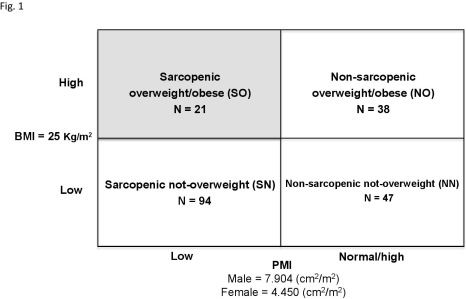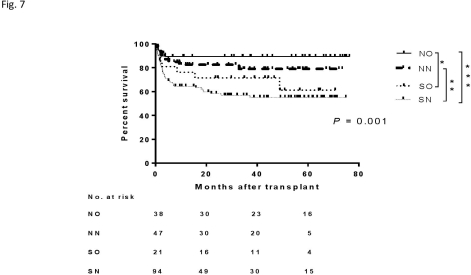Impact of Sarcopenia in Overweight/Obese Recipients on the Outcomes After Adult Living Donor Liver Transplantation.
A. Hammad,1,2 Y. Hamaguchi,2 S. Okumura,2 A. Kobayashi,2 S. Yagi,2 S. Uemoto,2 T. Kaido.2
1Department of Surgery, Mansoura University, Mansoura, Dakahliya, Egypt
2Division of Hepato-Biliary-Pancreatic and Transplant Surgery Department of Surgery, Graduate School of Medicine, Kyoto University, Kyoto, Japan.
Meeting: 2016 American Transplant Congress
Abstract number: A198
Keywords: Bacterial infection, Living-related liver donors, Obesity, Survival
Session Information
Session Name: Poster Session A: Living Donor Liver Transplantation
Session Type: Poster Session
Date: Saturday, June 11, 2016
Session Time: 5:30pm-7:30pm
 Presentation Time: 5:30pm-7:30pm
Presentation Time: 5:30pm-7:30pm
Location: Halls C&D
Background/purpose: The effects of body composition disturbances on liver transplantation outcomes have recently been in focus. However, the effects of obesity, as well as sarcopenic obesity, in patients undergoing liver transplantation are unclear. Methods: We evaluated the impact of preoperative obesity and sarcopenic obesity in 200 adult recipientsundergoing living donor liver transplantation at our institution between January 2008 and October 2013. Short-term outcomes and overall survival rates in patients classified according to preoperative BMI and psoas muscle index (PMI) were analyzed. Results: Patients with low PMI had higher major postoperative surgical complications (Clavien grade≥3a) (P<0.001), bacteremia (P=0.023) and lower overall survival (P<0.001) than normal/high PMI recipients. Overweight/obese recipients (BMI≥25) had higher overall survival (P=0.021) compared with not-overweight recipients (BMI<25). However, it did not retain independent prognostic value for post-transplant overall survival after subgroup classification. Sarcopenic overweight/obese recipients (low PMI and BMI≥25) had indifferent major complications, bacteremia and overall survival than the other recipients. Moreover, overall survival, postoperative bacteremia and major complications did not differ between sarcopenic overweight/obese and sarcopenic not-overweight (low PMI and BMI<25) recipients. Conclusion: preoperative obesity did not significantly impact post-transplant outcomes. Sarcopenic obesity conferred no added morbidity or mortality risks than stand-alone sarcopenia.

CITATION INFORMATION: Hammad A, Hamaguchi Y, Okumura S, Kobayashi A, Yagi S, Uemoto S, Kaido T. Impact of Sarcopenia in Overweight/Obese Recipients on the Outcomes After Adult Living Donor Liver Transplantation. Am J Transplant. 2016;16 (suppl 3).
To cite this abstract in AMA style:
Hammad A, Hamaguchi Y, Okumura S, Kobayashi A, Yagi S, Uemoto S, Kaido T. Impact of Sarcopenia in Overweight/Obese Recipients on the Outcomes After Adult Living Donor Liver Transplantation. [abstract]. Am J Transplant. 2016; 16 (suppl 3). https://atcmeetingabstracts.com/abstract/impact-of-sarcopenia-in-overweightobese-recipients-on-the-outcomes-after-adult-living-donor-liver-transplantation/. Accessed July 12, 2025.« Back to 2016 American Transplant Congress
